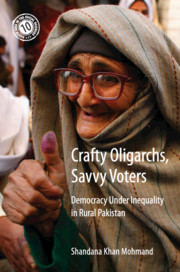Book contents
- Frontmatter
- Dedication
- Contents
- List of Tables and Figures
- Acknowledgements
- Glossary of Local Terms
- 1 Introduction: Rural Voters under Inequality in an Emerging Democracy
- 2 Colonial Constructs and Post-colonial Politics: 1849–2018
- 3 Landed Power in Sahiwal: From Domination to Intermediation
- 4 Local Competition and Bargaining Power: Conceptualising Political Engagement in Rural Punjab
- 5 Bargaining with Landlords: Comparing Political Engagement in Unequal Contexts
- 6 Structural Inequality and Variations in Political Engagement
- 7 When Do Shifts in Political Engagement Occur?
- 8 Conclusion: The Future of Pakistan's Democracy
- Annex 1 Chronology of Political Events in Pakistan
- Annex 2 Index of Political Engagement (IPE) Scores for 38 Villages
- Annex 3 Research Instruments
- Annex 4 Detailed Descriptions of Household Variables Used in Multivariate Regression Analysis
- Bibliography
- Index
6 - Structural Inequality and Variations in Political Engagement
Published online by Cambridge University Press: 26 April 2019
- Frontmatter
- Dedication
- Contents
- List of Tables and Figures
- Acknowledgements
- Glossary of Local Terms
- 1 Introduction: Rural Voters under Inequality in an Emerging Democracy
- 2 Colonial Constructs and Post-colonial Politics: 1849–2018
- 3 Landed Power in Sahiwal: From Domination to Intermediation
- 4 Local Competition and Bargaining Power: Conceptualising Political Engagement in Rural Punjab
- 5 Bargaining with Landlords: Comparing Political Engagement in Unequal Contexts
- 6 Structural Inequality and Variations in Political Engagement
- 7 When Do Shifts in Political Engagement Occur?
- 8 Conclusion: The Future of Pakistan's Democracy
- Annex 1 Chronology of Political Events in Pakistan
- Annex 2 Index of Political Engagement (IPE) Scores for 38 Villages
- Annex 3 Research Instruments
- Annex 4 Detailed Descriptions of Household Variables Used in Multivariate Regression Analysis
- Bibliography
- Index
Summary
We now have one main question that remains to be answered – what explains the differences in political engagement that we have observed across different types of villages? The comparisons across the six case study villages in the previous chapter suggest that much of the difference may be a result of unequal social structures, rather than unequal land distribution. Voters in Crown villages interact differently with their landed vote bloc leaders – there is less deference in the relationship, opposition is more open and bold, and the instrumental aspects of the relationship are more pronounced. This is a function of the less entrenched social influence of landed groups in these villages. Their social and political authority is constantly challenged – the more they find ways to consolidate it, the more the voters in these villages find ways to expand their own political space and the bargaining power they have within it. Our three Crown case study villages have consistently higher scores on the Index of Political Engagement (IPE) than Proprietary villages. The question to consider is whether this is a generalisable trend across the larger sample of 35 villages in Sargodha district. Are political outcomes determined by structural inequality?
A related task that this chapter takes on is to unravel the underlying structure and nature of political engagement in rural Pakistan across different types of villages and households. The anthropology and political economy literature on voting in Punjab focuses on describing the relational basis of electoral politics, but leaves a real gap in terms of providing rigorous analysis of the differences that underpin clientelism and kinship-based collective action in different local contexts. This chapter probes questions that have been left unanswered by this literature so far, including the extent to which relations of socio-economic dependence – the concept that so fires the public imagination in Pakistan – are still to be found in linkages between rural voters and their landlords, patrons and kin leaders. It asks about the ways in which the regular interaction of Punjabi voters with political leaders of higher status affects both the relational basis of voting, and the nature of political engagement and collective bargaining that underpins it.
- Type
- Chapter
- Information
- Crafty Oligarchs, Savvy VotersDemocracy under Inequality in Rural Pakistan, pp. 190 - 216Publisher: Cambridge University PressPrint publication year: 2019



